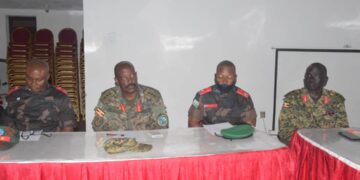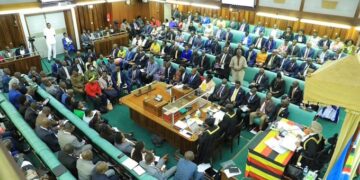The Deputy Speaker of Parliament, Thomas Tayebwa, has challenged the United Nations Security Council chiefs to create two permanent seats for African representatives in renewed calls for the organ’s restructurings.
Speaking at the 63rd Organisation of African, Caribbean, and Pacific States (OACPS) – European Union Joint Parliamentary Assembly on Tuesday in Brussels, Belgium, Tayebwa argued that it is a dishonor for Africa, which is three times bigger than Europe, not to be permanently represented at the UN Security Council.
According to Tayebwa, there are no permanent members from Latin America or Africa, and China is the only Asian member which damages the legitimacy of the Security Council if it is seen as a forum dominated by the Western powers, where the global South and smaller states are marginalized.
The Deputy Speaker stressed that the unrepresentative nature of the council came into play during the Libyan conflict in 2011, where he observed that the UN Security Council approved the bombardment of the North African country without the input of Africa.
Zimbabwe’s Deputy President of the Senate, General Michael Reuben Nyambuya, agreed with Tayebwa’s position, arguing that the reforms are urgently needed for equity in representation.
Nyambuya argued that an enlarged council should include at least two permanent seats and five non-permanent seats for Africa; noting that the current dispensation is not democratic and makes a mockery of the lectures which Africans get on democracy.
Africa has always been irked with the skewed membership of the United Nations Security Council, with the 2005 Ezulwini consensus and Sirte declaration in which the African Union member states resolved that Africa should be accorded two permanent seats at the council, which has since never come to fruition.
Other African representatives at the summit observed that the continued exclusion of Africans from permanent representation at the UN Security Council has stalled the continent’s agenda in rolling back against climate change, insecurity, terrorism, and poverty which are discussed in an organ where the continent isn’t represented.
Founded in 1945, the five permanent members of the UN Security Council include; the United States of America, the United Kingdom, China, Russia, and France. Notably, any changes to include other countries, even if passed by the United Nations General Assembly, will still require the approval of the five permanent members.
The 63rd Organisation of African, Caribbean, and Pacific States (OACPS) – European Union Joint Parliamentary Assembly kicked off on the 18th and will end today 28 June 2023.














